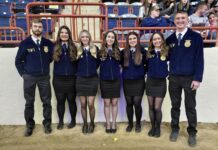Last spring, watching our high school softball team, I saw my first drag bunt. It was sweet.
The batter, who happened to be the lead-off hitter, was a speedy lefty. I have no idea about the mechanics, but basically, as the ball is pitched, the batter takes a running step toward the pitcher (staying in the batter’s box, of course), lays down a soft ground ball and is halfway to first base before anyone can react.
I don’t know what Dana’s stats were for her junior and senior year, but she turned a lot of drag bunts into base hits. More importantly, she was on base and, with her speed, could easily advance.
It’s part of baseball and softball’s “small ball” offensive strategy: bases on balls, stolen bases, bunts, sacrifice fly advances, and aggressive base running. White Sox Manager Ozzie Guillen said the tactic should be called “smart ball”, after his team used it to perfection en route to the 2005 World Series title.
As farmers and farm leaders struggle to figure out strategies to educate a growing farm-illiterate consumer population, maybe they should take a page from the coaching manual and try small ball — methodically undertake individual efforts and be opportunistic, rather than swing for the fences.
There are incremental steps that positively impact agricultural awareness: championing Ag in the Classroom, farm tours (both school field trips and drive-it-yourself tours), speaking to local Rotary groups and garden clubs, letters to the editor, writing comments on online blogs or columns.
There are also opportunities for agriculture to go on the offensive, as some predict will happen in Ohio this year in light of the February visit by Humane Society of the United States (HSUS) leadership. The Humane Society of the United States has targeted Ohio as the next state for its animal welfare initiatives. Small ball strategy would have us get some base runners in place — in the form of legislation — and score some insurance runs before that happens.
We can solidify ag supporters on a county-by-county basis; we can work individually within our own personal circle of influence; we can shape the questions. Small can still be nimble. Small, individual efforts can still garner big results, and shape ag awareness.
We can’t depend solely on the clean-up batter — Ohio’s most powerful ag group, the Ohio Farm Bureau — to hit the grand slam homerun. Every member of the team — each individual producer — has to grab the opportunity to tell his story.
The trick is for each of us to be working toward the same goal — increasing awareness of the positive impact of agriculture on the environment, the economy and the food chain.
They often call a run earned with small-ball strategy as a “manufactured run,” because runners advance on strategy or sacrifices rather than power hitting.
In the end, however, it’s still a run. And that’s what wins games.













Oklahoma brought a law that will control HSUS and Peta. They brought the law before HSUS got there. Basically it says it’s illegal for the HSUS and others to set themselfs up as the police. Take steps to keep Animal rights out of your State.